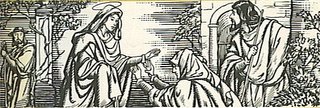Flight of the Holy Family into Egypt

Chapter 7
HEROD WANTED TO USE THE MAGI for his evil designs. When they failed to return to him and had disappeared from sight, he was sure a conspiracy was afoot to dethrone him. He acted quickly and ruthlessly. Immediate death for all boys of Jesus' age in the region of Bethlehem was Herod's plan. But God was protecting His Son. After the departure of the Magi, Joseph was visited in a dream by an angel who informed him of Herod's evil plan and commanded him to leave immediately with Jesus and Mary for Egypt, the traditional refuge of persecuted Jews. "Arise, and take the Child and His mother, and flee into Egypt, and remain there until I tell thee. For Herod will seek the child to destroy him."
As head of the Holy Family, Joseph received this message and proceeded at once to carry out the direction given him. He wakened Mary and they left with the Christ Child while it was yet night. The journey from Palestine to Egypt was a long and arduous one, about 250 miles; but they made it in safety.
The murderous agents of Herod did their work in Bethlehem; the male infants were slaughtered. It was a small town, and the number of slain children was probably about twenty. These first to shed their blood for Christ have become known to later centuries as the Holy Innocents.
The security bought by Herod with the blood of innocent children did not profit him for long. A strange sickness soon overtook him which slowly and torturously led him to death.
Again, in the place of his exile in Egypt, an angel of the
Lord appeared to Joseph in a dream and told him, "Arise, and
take the child and His mother, and go into the land of Israel,
for those who sought the child's life are dead." Again promptly
obeying the heavenly command, Joseph recrossed the desert
between Egypt and Palestine with Mary and her Son. Upon
their arrival in southern Israel, however, he learned that Herod's cruel son Archelaus was reigning in Judea, and he was
afraid to return to Bethlehem. Receiving a warning in another
dream, he withdrew instead to the north, to Galilee, and settled in Nazareth.

The angel did not appear to Mary; she had received no direct message about a danger to Jesus' life. In such extraordinary circumstances, she might have questioned the need for flight, at least for so long a flight and so sudden a departure. Yet she arose and left immediately, so soon as Joseph informed her that they were to flee. Mary's obedience to God's will was prompt, whether God spoke to her through His solemn commandments, or through the voice of Joseph. Do we take the same generous attitude toward God's will, or do we try at times to evade our obligations?












